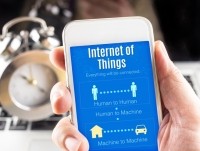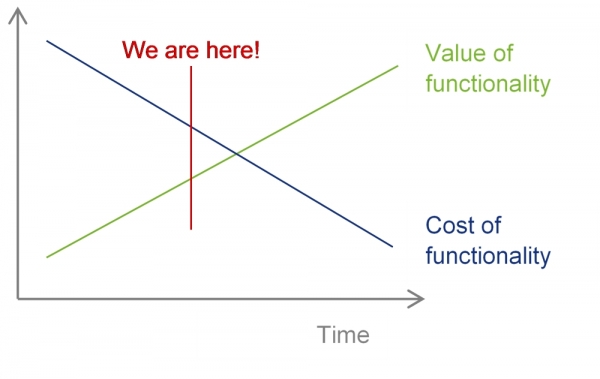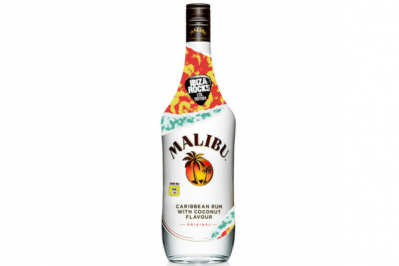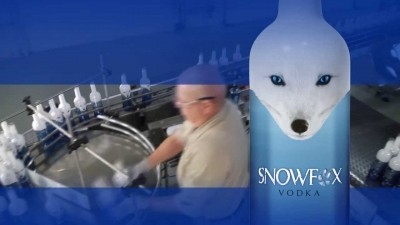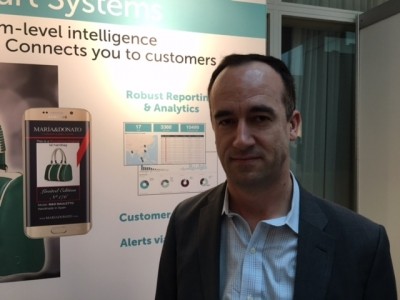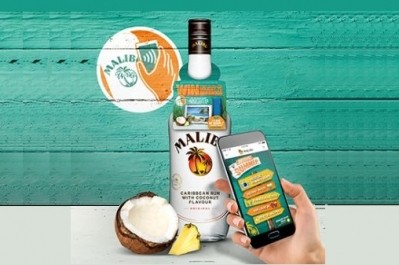Guest article
Is the IoT ever going to bring a breakthrough in the beverage sector?
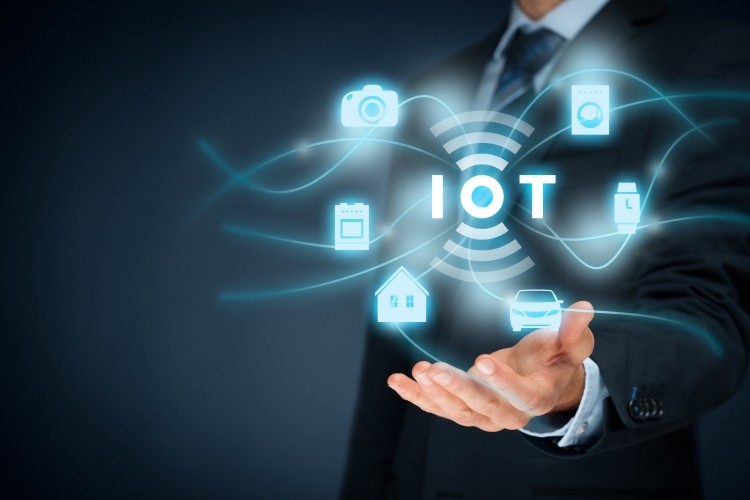
Yes, there are examples like the Amazon Dash button which does start to take us into that realm, and there have been examples of NFC tags on spirit bottles and WiFi hot spots on beer fonts.
But I don’t think that anything has really taken hold and shown the world what the Internet of Things (IoT) means to the beverage world.
And I think the reason for this is pretty simple – the value of the functionality that has been dreamt up has not yet exceeded the cost of adding that functionality.
And that includes value for consumers, beverage company customers and the beverage companies themselves.
And so is IoT really a technology that will ever be adopted by the beverage sector? I strongly believe so.
Development of the technology
My massively simplified graph (below) shows that the cost of this technology is falling.
That’s pretty obvious as technology always follows this trend. However, a step change is coming in the form of wireless technologies such as Bluetooth starting to truly follow Moore’s law of reducing size of silicon area and cost due to the analogue part of the radios no longer being required.
Ultimately this could enable Bluetooth connectivity to be added to packaging at a cost that is similar to adding NFC today but with far greater functionality possible.
Development of ideas
Something that I also see happening is more and more valuable ideas and functions being considered.
I think everyone is in agreement that IoT provides the opportunity for consumer brands to engage more directly with consumers, learn more about them and how they use their products, and give consumers more convenience and a greater experience.
However, coming up with specific concepts that achieve this has been hard. But brands have been experimenting – this is crucial to test the value of those ideas (or at least the principles behind those ideas) for consumers and their business.
'Brands have been experimenting - and this is crucial to test the value of ideas'
Well-known examples include Heineken’s Ignite bottles, Suntory’s connected whisky glasses, NFC tags on Johnny Walker bottles and even things like the partnership between Budweiser and Uber. These are perhaps not sustainable ideas for long-term deployment, but understanding how they worked is crucial to inform the innovation process.
But consumer and commercial insight is not the only thing you need – a deep understanding of the capabilities of the technologies is important and it can also help to spark ideas for functionality, particularly when we look at how those technologies are being used by different industries.
Something that I don’t think brands are doing enough is considering alternative business models. IoT is a great platform to enable a move from a product to a service model. I do think companies having a vision to move entirely beyond selling containers of liquid to selling refreshment, nutrition or stimulation is an interesting but far-out idea. However, there are plenty of opportunities to use IoT to find alternative revenue streams, be that from data or transactions.
The challenge is that this requires a good understanding of how the IoT, the cloud and its software works – do you know what an API is, for example?
So what are the opportunities?
Well, isn’t that the hundred million dollar question! I can’t claim to have all the answers but here are a couple of thoughts:
'I see a huge opportunity for F&B companies to provide services that keep consumers healthy'
- Health and nutrition management – a hot topic in the industry is sugar, obesity and related issues. With the proliferation of wearable technology, much of the challenge of how to help consumers manage their calorie intake is there. Clearly, more technology development is needed to sense more physiological attributes and also work out how to capture what is being consumed, but these are all coming. I see a huge opportunity for food and beverage companies to take the initiative and provide services that help keep their consumers healthy.
- Personalised experiences – personalisation has been a trend for many years, and IoT and associated technologies provide the opportunity to enrich the experience, engage more senses and connect to the consumer in lots of different ways (beyond just flavour and pack design options). The experience can be unique to every consumer, furthering the differentiation and allowing the brand to learn more about what works and what doesn’t. But the key thing that IoT can bring is learning preferences to ensure that the consumer always gets something they are happy with, but also so that the brand has far greater insight into what the micro trends are for its products.
But my overall conclusion is that brands need to think big and build up a road map. Testing and trying out different ideas is important, as is understanding the evolution of the enabling technology.
It will take a while for the technology to be cheap enough for individual ideas or functions to make financial sense. In the meantime we need to continue to trial ideas – and, in any mass deployment, we need multiple functions and revenue models for each technology installation, with a road map of how this evolves and is upgraded over time.
I really believe that this is possible to achieve now and can benefit consumers, customers and brands alike. The key challenge, though, is that most companies don’t have the breadth of skills and experience needed to work together to create this vision.
About the author: As Head of Food and Beverage Systems, Edd Brunner is responsible for all the work Cambridge Consultants does in the food and beverage market.
This includes understanding clients' needs and reviewing the work being performed by the Cambridge Consultants team and checking that it constantly meets clients' commercial and technical requirements.
